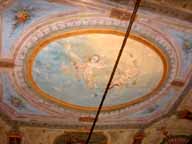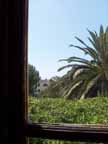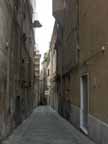This passage from Pictures from Italy, which has been scanned and edited by Philip V. Allingham, appears on pp. 27-31 of the edition published in Americas by Collier; see bibliography below.]
THE first impressions of such a place as ALBARO, the suburb of Genoa where I am now, as my American friends would say, "located," can hardly fail, I should imagine, to be mournful and disappointing. It requires a little time and use to overcome the feeling of depression consequent, at first, on so much ruin and neglect. Novelty, pleasant to most people, is particularly delightful, I think, to me. I am not easily dispirited when I have the means of pursuing my own fancies and occupations; and I believe I have some natural aptitude for accommodating myself to circumstances. But, as yet, I stroll about here, in all the holes and corners of the neighbourhood, in a perpetual state of forlorn surprise; and returning to my villa: the Villa Bagnerello (it sounds romantic, but Signor Bagnerello is a butcher hard by); have sufficient occupation in pondering over my new experiences, and comparing them, very much to my own amusement, with my expectations, until I wander out again.

The Villa Bagnerello: or the Pink Jail, a far more expressive name for the mansion: is in one of the most splendid situations imaginable. The noble bay of Genoa, with the deep blue Mediterranean, lies stretched out near at hand; monstrous old desolate houses and palaces are dotted all about; lofty hills, with their tops often hidden in the clouds, and with strong forts perched high up on their craggy sides, are close upon the left; and in front, stretching from the walls of the house, down to a ruined chapel which stands upon the bold and picturesque rocks on the sea-shore, are green vineyards, where you may wander all day long in partial shade, through interminable vistas of grapes, trained on a rough trellis-work across the narrow paths.
This sequestered spot is approached by lanes so very narrow, that when we arrived at the Custom-house, we found the people here had taken the measure of the narrowest among them, and were waiting to apply it to the carriage; which ceremony was gravely performed in the street, while we all stood by, in breathless suspense. It was found to be a very tight fit, but just a possibility and no more—as I am reminded every day, by the sight of various large holes which it punched in the walls on either side as it came along. We are more fortunate, I am told, than an old lady who took a house in these parts not long ago, and who stuck fast in her carriage in a lane ; and as it was impossible to open one of the doors, she was obliged to submit to the indignity of being hauled through one of the little front windows, like a harlequin.
When you have got through these narrow lanes, you come to an archway, imperfectly stopped up by a rusty old gate — my gate. The rusty old gate has a bell to correspond, which you ring as long as you like, and which nobody answers as it has no connexion whatever with the house. But there is a rusty old knocker, too—very loose, so that it slides round when you touch it—and if you learn the trick of it, and knock long enough, somebody comes. The Brave Courier comes, and gives you admittance. You walk into a seedy little garden; all wild and weedy, from which the vineyard opens; cross it, enter a square ball like a cellar, walk up a cracked marble staircase, and pass into a most enormous room with a vaulted roof and whitewashed walls: not unlike a great Methodist chapel. This is the sala. It has five windows and five doors, and is decorated with pictures which would gladded the heart of one of those picture-cleaners in London who hang up, as a sign, a picture divided, like Death and the Lady, at the top of the old ballad: which always leaves you in a state of uncertainty whether the ingenious professor has cleaned one half or dirtied the other. The furniture of this sala is a sort of [28/29] red brocade. All the chairs are immovable, and the sofa weighs several tons.
On the same floor, and opening out of the same chamber, are dining-room, drawing-room, and divers bedrooms; each with a multiplicity of doors and windows. Up stairs are divers other gaunt chambers, and a kitchen; and down stairs is another kitchen, which, with all sorts of strange contrivances for burning charcoal, looks like an alchemical laboratory. There are also sonic half-dozen small sitting-rooms, where the servants, in this hot July, may escape from the heat of the fire, and where the Brave Courier plays all sorts of musical instruments of his own manufacture, all the evening long. A mighty old, wandering, ghostly, echoing, grim, bare house it is, as ever I beheld or thought of.


Frescos in the sala at the Villa della Vista (Bagnerello) after restoration. [Click on the thumbnail for a larger image.]
There is a little vine-covered terrace, opening from the drawing-room; and under this terrace, and forming one side of the little garden, is what used to be the stable. It is now a cow-house, and has three cows in it, so that we get new milk by the bucketful. There is no pasturage near, and they never go out, but are constantly lying down and surfeiting themselves with vine-leaves—perfect Italian cows—enjoying the dolce far' niente all day long. They are presided over, and slept with, by an old man named Antonio, and his son: two burnt-sienna natives with naked legs and feet, who wear, each, a shut, a pair of trousers, and a red sash, with a relic, or some sacred charm like a bonbon off a twelfth-cake, hanging round the neck. The old man is very anxious to convert me to the Catholic faith; and exhorts me frequently. We sit upon a stone by the door, sometimes, in the evening, like Robinson Crusoe and Friday reversed; and he generally relates, towards my eon version, an abridgment of the History of Saint Peter—chiefly, I believe, from the unspeakable delight he has in his imitation of the cock.

The palm tree Dickens blamed for all the mosquitoes at the Villa della Vista (Bagnerello). [Click on the thumbnail for a larger image.]
The view, as I have said, is charming; but in the day you must keep the lattice-blinds close shut, or the sun would drive you mad; and when the sun goes down you must shut up all the windows, or the mosquitoes would [29/30] tempt you to commit suicide. So at this time of the year, you don't see much of the prospect within doors. As for the flies, you don't mind them. Nor the fleas, whose size is prodigious, and whose name is Legion, and who populate the coach-house to that extent that I daily expect to see the carriage going off bodily, drawn by myriads of industrious fleas in harness. The rats are kept away, quite comfortably, by scores of lean cats, who roam about the garden for that purpose. The lizards, of course, nobody cares for; they play in the sun, and don't bite. The little scorpions are merely curious. The beetles are rather late, and have not appeared yet. The frogs are company. There is a preserve of them in the grounds of the next villa; and after nightfall, one would think that scores upon scores of women in pattens were going up and down a wet stone pavement without a moment's cessation. That is exactly the noise they make.
The ruined chapel, on the picturesque and beautiful sea shore, was dedicated, once upon a time, to Saint John the Baptist. I believe there is a legend that Saint John's bones were received there, with various solemnities, when they were first brought to Genoa; for Genoa possesses them to this day. When there is any uncommon tempest at sea, they are brought out and exhibited to the raging weather, which they never fail to calm. In consequence of this connexion of Saint John with the city, great numbers of the common people are christened Giovanni Battista, which latter name is pronounced in the Genoese patois "Batcheetcha," like a sneeze. To hear everybody calling everybody else Batcheetcha, on a Sunday, or Festa-day, when there are crowds in the streets, is not a little singular and amusing to a stranger.

A typical "vico" or narrow lane in Genoa. [Click on the thumbnail for a larger image.]
The narrow lanes have great villas opening into them, whose walls (outside walls, I mean) are profusely painted with all sorts of subjects, grim and holy. But time and the sea-air have nearly obliterated them; and they look like the entrance to Vauxhall Gardens on a sunny day. The court-yards of these houses are overgrown with grass and weeds; all sorts of hideous patches cover the bases of the [30/31] statues, as if they were afflicted with a cutaneous disorder; the outer gates are rusty; and the iron bars outside the lower windows are all tumbling down. Firewood is kept in hails where costly treasures might be heaped up, mountains high; waterfalls are dry and choked; fountains, too dull to play, and too lazy to work, have just enough recollection of their identity, in their sleep, to make the neighbourhood damp; and the sirocco wind is often blowing over all these things for days together, like a gigantic oven out for a holiday.
Related Material
- "The Strada Nuova (The Streets of Palaces)" from Pictures from Italy
- Palazzo Peschiere and Genoa — a Gallery of Places Dickens lived or visited
- Dickens and Family at the Villa di Bella Vista (The Bagnerello), Albaro: July-September, 1844
References
Dickens, Charles. American Notes & Pictures from Italy. New York: P. F. Collier & Son, n. d. [Originally published in London by Bradbury & Evans in May 1846).
Last modified 23 February 2024